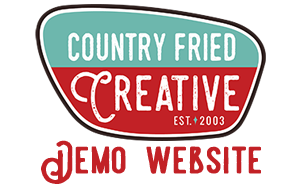by Joe Domaleski | Apr 16, 2024 | Blog, Business, Columnists, Community, Front Page, News Center, Opinion, Top News
When I look back over my accomplishments and failures in life, two things seem to have made the most impact on determining success or failure: attitude and pace. Both of these factors are entirely manageable. Don’t get me wrong—external factors can impact how things turn out, but in many cases, external forces can be overcome with a positive attitude and a proper pace.
I’m writing this article the day after the 2024 Boston Marathon. I ran my first Boston Marathon back in 1998 and often consider the connections between running and life. A runner toeing the starting line of a race has to believe (attitude) they can reach their goal and they have to set a proper tempo to make it to the finish line without going too fast or too slow (pace). Let’s consider what this means in your business and personal life.
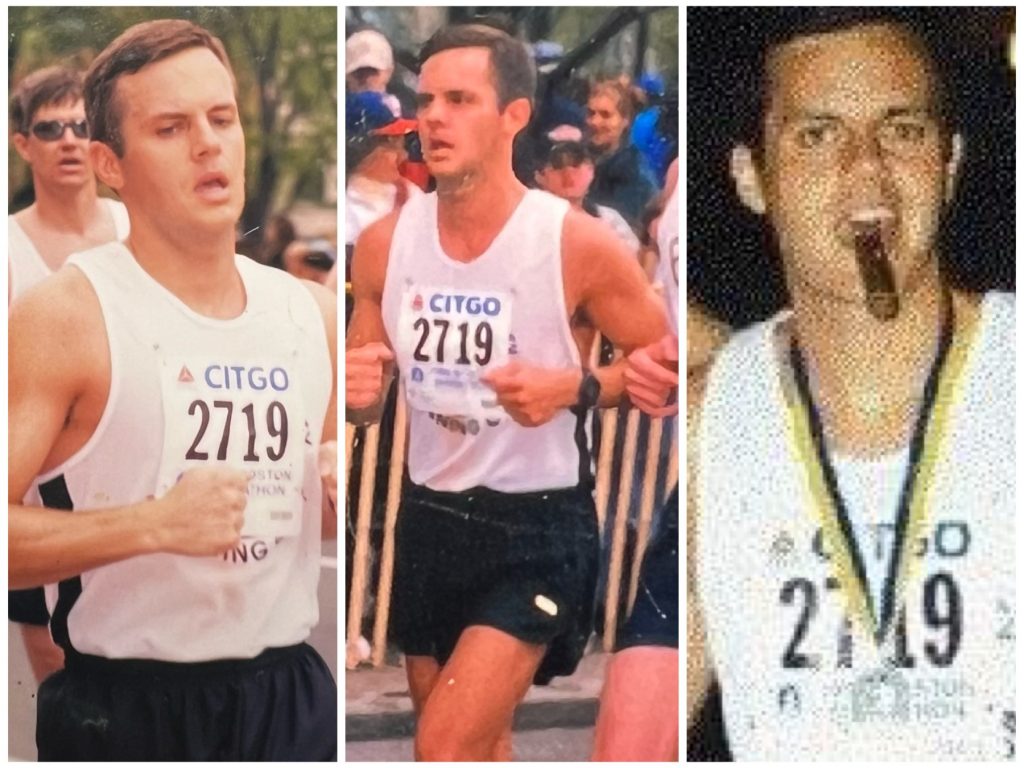
My first Boston Marathon on Patriot’s Day – April 20, 1998. Yes, I celebrated my completion of the race with a cigar! Photo/Joe Domaleski
You’ve probably heard it before, but attitude is everything. A good leader needs to believe success is possible and convey that hope and optimism to his/her team. I’ve written previously about being a leader of hope. Having a positive attitude doesn’t mean one should ignore risks, resource constraints, and reality. It does mean that oftentimes human beings have the ability to transcend limitations with the proper mindset. Like most entrepreneurs, I started my business with the expectation of success, despite the inherent risks.
Setting a proper pace ensures that forward progress is maintained without going too fast and burning out. Equally as important is to ensure that the pace is swift enough that things don’t drag out causing a loss of motivation. An effective leader, like an orchestra conductor, knows how to set the proper tempo to ensure that everyone maintains the right speed. Because people tend to naturally move at different paces, it’s not always easy to keep everyone together. Some people are like great sprinters who have raw speed, but they have a hard time maintaining consistency over a long haul. Others, myself included, tend to be distance runners who don’t move as fast as the sprinters but we can stay the course for a long time. Finding the balance between speed and endurance can be tricky at best.
You’ve probably seen the funny “Six Phases of a Project” list that’s been around since the late 70s. Although its origins are lost to time, I thought it might be fun to consider each of the phases in both a funny and practical way. Whether it’s a specific project, campaign, or task you’re trying to accomplish, I think this list is relevant.
- Enthusiasm – as mentioned above, most endeavors start with enthusiasm and belief that success is possible, even if there’s not a clear path on how to do it. Although “pain avoidance” is sometimes a motivating factor to get something done (i.e. “choosing the lesser of two evils”), it’s generally better to aim for a more positive outcome fueled with enthusiasm.
- Disillusionment – most worthwhile projects encounter one or more periods of disillusionment fueled by FUD – fear, uncertainty, and doubt. Sometimes FUD can lead to a failure to even get started. Rarely do things go according to plan and that’s when one’s resolve is tested. Change fatigue, missed details, and uncomfortable situations can contribute to disillusionment. The way to combat disillusionment is to “rally the troops” and recommit to the objective. Disillusionment is fixable.
- Panic – sometimes disillusionment can lead to panic. Whereas disillusionment is usually temporary discomfort, panic is the genuine fear of failure. The key word is “fear” – whether it’s based on reality or just perception. At the panic stage, people tend to become less rational and make emotionally charged decisions. If it’s truly a panic situation, the leader needs to intervene and make changes. Changes may include slowing down the pace, changing the staff assignments, recalibrating the objectives, or adjusting the amount of resources. Equally important to the changes is the leader’s commitment and enthusiasm that success can be achieved. If the leader doesn’t believe in success, no one on the team will believe it. In rare cases, it may be time to “abandon ship” if everyone involved agrees the situation isn’t tenable. Very rarely have I seen this type of situation and, quite the contrary, I most often see people giving up when they’re on the cusp of victory.
- Search for the guilty – when things begin to drift and stray from the plan, people tend to ascribe blame. A true leader accepts responsibility for a negative situation. A weak leader blames other people or circumstances. Unfortunately, this is all too common in today’s society. Everyone wants to have a scapegoat. If you are enthusiastic about the end goal and you’re running a proper pace towards a realistic objective, my advice is to stay the course and avoid the blame game. Make needed changes to overcome obstacles, but avoid the “blame game”.
- Punishment of the innocent – this doesn’t always happen, but when it does it’s a real head scratcher. Unfortunately, there’s a natural human tendency to criticize and even blame the person (or team) who’s actually in the “battle” trying to do the right thing. This can happen when someone in an organization has enough clout or status that they can transfer blame from themselves to others in a “trickle down” effect. When this happens, it’s hard to maintain enthusiasm and pacing for a project – or any future endeavors with the same so-called leader.
- Praise for those not involved – this is probably my biggest pet peeve – attention and glory “hogs”. Unfortunately, this happens all too often. I really enjoy hearing about people and teams that overcome adversity to achieve great things. They should receive the praise and attention. Unfortunately, oftentimes we just hear or see about the figureheads who show up when it’s picture time. You know what I’m talking bout, it happens all of the time. Someone will get the overall credit and praise, even if their only contribution to the effort was their “status” in the community. A true leader puts their team on the winner’s platform, not himself or herself. It’s hard to be enthusiastic or stay in the game when the accolades are awarded to non-participants.
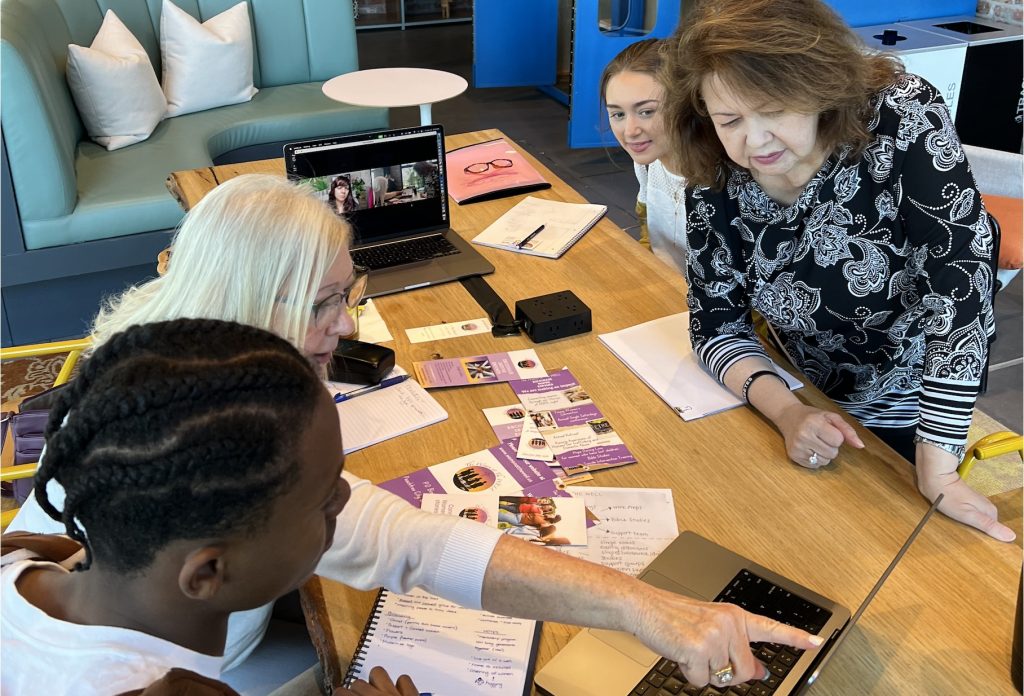
Enthusiastic branding project kick-off for the Women at the WELL ministry. (L-R) Zavion Green, Debbie Gronner, Janine Baggett (via Zoom on the laptop), Mia Scarbrough, and Marta Fewell. April 11, 2024 at Trilith. Photo/Joe Domaleski
In order to cross the finish line in a marathon or complete a project at work, it’s been my experience that a combination of enthusiasm and pacing can mean the difference between success or failure. Be the type of leader who sets worthwhile goals and enthusiastically leads the way. Ensure you and your team are keeping a realistic pace by not running too fast or too slowly. When things don’t go as planned, avoid placing blame on anyone but yourself. Make needed changes, but stay in the race if it’s winnable. Seek out opportunities to praise your team and spotlight their accomplishments, not your own. If you do these things, your team is more likely to help you tackle bigger and better things in the future. How’s your enthusiasm and pace holding up out there?
[Joe Domaleski, a Fayette County resident for 25 years, is the owner of Country Fried Creative – an award-winning digital marketing agency located in Peachtree City. His company was the Fayette Chamber’s 2021 Small Business of the Year. Joe is a husband, father of three grown children, and proud Army veteran. He has an MBA from Georgia State University and enjoys sharing his perspectives drawing from thirty years of business leadership experience. Sign up for the Country Fried Creative newsletter to get marketing and business articles directly in your inbox. ]
by Joe Domaleski | Apr 9, 2024 | Blog, Business, Columnists, Community, News Center, Opinion, Top News
Where were you during the great solar eclipse of April 8, 2024? I spent the afternoon in Fayetteville at our remote office located in the Town of Trilith. We were blessed with a nearly cloudless sky, creating the perfect conditions to see the solar eclipse in which the moon passes between the sun and Earth. Although not full totality from my location, we did have about 82% blockage of the sun.
Around 2:30pm, I stepped outside to view the eclipse. My immediate impression was that nothing was different other than noticing others looking up at the sun with special glasses, looking like moviegoers at a 3D movie. Moviegoers at Trilith? How befitting with the studio complex directly across the street. The irony is not lost on me, and I’m a movie fan myself.

The author viewing the solar eclipse from Trilith on 4/8/2024. Photo/Joe Domaleski
I had enough common sense not to stare up at the sun without protection, so first I decided to try my polarized sunglasses (please do NOT do this, I later found out that even properly rated “regular” sunglasses don’t offer enough protection). It didn’t matter anyway because the sun was so bright I couldn’t look at it even with the sunglasses on – no eclipse.
Next, I took out my solar eclipse glasses. They looked like 3D glasses, as noted previously. The lenses were very darkly tinted, so much so that I couldn’t see anything with them. With my cardboard solar eclipse glasses on, I gazed up towards the sun. Wow! I could see the outline of the moon covering up about 1/3 of the sun. That’s all I could see with these filtered glasses. As soon as I looked away from the sun and took them off, it was a regular bright sunny spring afternoon. I shared my glasses with some other bystanders who were equally amazed.
After sharing my glasses, I put them back on and sat in one of the nearby Adirondack chairs and spent the next 30 minutes watching the moon slide across the sun. It was amazing. Around 3:05 pm, the peak totality of 82% for our area was achieved. Without the glasses, it was like an ordinary day except it seemed like the sun was filtered a little as if there were clouds, even though there weren’t any clouds. With the filtered glasses on, it was a totally different experience.
Filters are good and sometimes very necessary tools in life. We often talk about getting the unfiltered truth or data as if that’s always desired, but sometimes information can only be seen with a filter – much like the solar eclipse. Ask any photographer about the importance of filters. I spent the evening thinking about filters, which inspired this article. Just as my solar eclipse glasses were used to filter out harmful rays and allow the eclipse to be seen, businesses need filters to help discern and prioritize important information while minimizing distractions and even risks.
Here are some types of filters that I find useful in business:
- Information filtering – As a business leader, I’m simply drowning in information. Much has been written about information overload, and I know I’m not unique in this regard. One can simply spend all day trying to stay “in the loop” without actually doing anything. I often filter information by carefully using summaries. Every business presentation should have an Executive Summary. Do you use spreadsheets? Me too. The Filter function in Microsoft Excel is a lifesaver.
- Email / message filtering – Like you, I’m also overwhelmed with communications via emails, text messages, app alerts, phone calls, etc. I try to be very responsive, but I also have to be selective in processing communications. I filter my digital inbox using email and messaging rules so that the truly important stuff bubbles up to the top. Other stuff is still accessible when I have time to get to it. Family always gets top priority followed by my staff at work. I tell clients that they can always contact me directly via phone or text message to bypass the filter, but only if it’s an emergency. Most of my work filtering is done on purpose in order to ensure things are handled properly by the right people, which isn’t always me. If people go straight to me, I can become a bottleneck and I don’t want that.
- Opportunity filtering – One of my most important functions as a business leader is new business development. I’ve written previously about the importance of sales, but I also know that not every new opportunity is something to consider. On a daily basis various and sundry businesses are either trying to sell me things -or- buy my business. I have to filter those opportunities or else I’d be wasting my time and theirs.
- Decision filtering – Not every decision needs to be made by me, nor is every decision something that needs to be made immediately. Sometimes delaying a decision will cause the issue to resolve itself or by someone better equipped to handle it. In general, I believe decisions should be made at the lowest level in an organization where it makes sense. Doing so promotes empowerment and responsibility. If something makes it through the filters up to me, then my expectation is that it’s something that warrants my personal attention.
- News filtering – Recently I wrote a piece about where I get my news and the importance of getting it from a wide variety of sources. While it’s important to gain insights from a variety of perspectives, it’s also necessary to filter some of the news sources so that no one source or topic becomes dominant. I filter my news by source, topic, and format. I get headline news on my iPhone and Apple Watch, which keeps me dialed into breaking news. I read the news on my iPad and laptop for a deeper dive. Filtering allows me to focus on what’s important.
- Emotional filtering – Most of the filtering I’ve mentioned so far is fairly objective based on easy-to-define criteria. Emotional filtering is very subjective. As humans, we are emotional and moody creatures. Expressing emotions and allowing others to do the same is something uniquely human and not something that’ll be replaced by Artificial Intelligence (AI). Discretion is often needed to filter out unproductive emotions or ones that may be harmful to others. It’s also important when someone else is being emotional to react appropriately and apply a meaningful and compassionate filter in order to see things in a proper light.
- Time filtering – How I choose to spend my time is perhaps the most important decision I make as a leader. Time management is a personal decision informed by a number of factors. Being able to filter my time by priority, importance, and urgency allows me to be more effective overall so that the “squeaky wheel” isn’t the only thing getting attention. I personally use my Apple Calendar which syncs across all of my devices and has a handy filter option to help me manage my time. Filtering my time ensures I live a well balanced and productive life each day.
Solar eclipses are truly magical events, and the next one doesn’t happen for another 20 years here in North America. Assuming I’m still around, I can’t wait until it happens again. For a brief two-hour block of time, many people stopped what they were doing to view the eclipse. Many schools and local organizations had special viewing events. Sporting events stopped so that people could view it. I even encouraged my staff to go outside and safely view the eclipse. I read a statistic from Cloudflare that suggests that Internet traffic decreased by 50% in some locations during the eclipse event. Yet, the eclipse was only viewable with specially filtered glasses. To see the eclipse, a filter was necessary to not only protect my eyes but also to see the eclipse itself. When properly used, filters can promote efficiency, focus, empowerment, and risk mitigation. Whether you’re looking at a solar event like the eclipse or trying to focus in a busy world, filters can go a long way in ensuring clarity.
[Joe Domaleski, a Fayette County resident for 25 years, is the owner of Country Fried Creative – an award-winning digital marketing agency located in Peachtree City. His company was the Fayette Chamber’s 2021 Small Business of the Year. Joe is a husband, father of three grown children, and proud Army veteran. He has an MBA from Georgia State University and enjoys sharing his perspectives drawing from thirty years of business leadership experience. Sign up for the Country Fried Creative newsletter to get marketing and business articles directly in your inbox. ]
by Joe Domaleski | Apr 1, 2024 | Blog, Business, Columnists, Community, Front Page, News Center, Opinion, Top News
When you’ve done most of the things you want to do in life, sometimes it’s time to hit the reset button and try something new. Despite the concern from our employees, we’ve decided to launch a new hot sauce! Yes, you read that correctly.
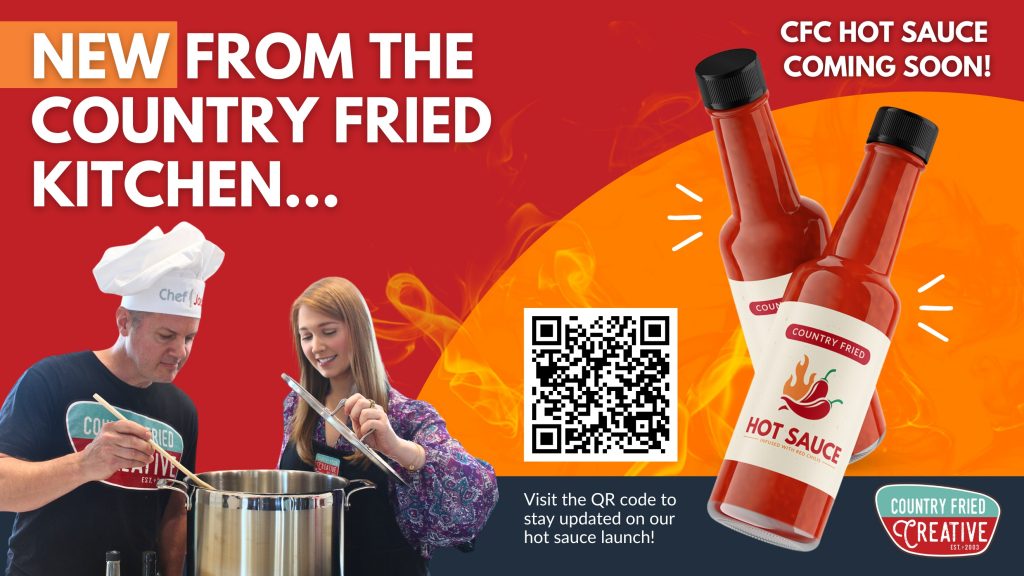
The ad that’ll be running for our new hot sauce. Pictured are: Chef Joe Domaleski and Christina Colantonio. Photo/Abby Paver
I can’t think of a better way to spice things up than with homemade hot sauce. My digital marketing agency, Country Fried Creative, is often mistaken for being a restaurant or food services company, so why not lean into that natural assumption?

Newlyweds Joe and Mary Catherine Domaleski celebrate the creation of Joe’s Polish Inferno hot sauce in 1994. Photo/Joe Domaleski
This isn’t my first time making hot sauce. When Mary Catherine and I got married back in 1994, we didn’t have a lot of money, so we decided to make Christmas gifts that year. We spent some time in the kitchen and came up with “Joe’s Polish Inferno,” a homemade hot sauce infused with habanero peppers and fresh tomatoes. My new father-in-law, Bill, was quite impressed by the flavor and intensity. Fast forward to 2024.
So why launch a new hot sauce? Last summer, we celebrated our 20th year in business and had a big party at Line Creek Bus Barn in Fayetteville. During the party, a few of my clients asked me what’s next for the company. More than one suggested that I do something new and unexpected in 2024 to reinvigorate our brand. One colleague, who’ll remain anonymous, suggested that we do something related to food. Earlier in the year, we helped Peachtree City-based Chef Mark brand his Pelle’s pasta sauce. That inspired me and brought back memories from thirty years ago when I made hot sauce out of economic necessity.
Inspired by encouragement for the future and fond memories of the past, I made the business decision to spend some time in the kitchen last fall to see what we could come up with. All through the Christmas holidays and into the beginning of the new year, we’ve been perfecting the homemade recipe. I’d like to thank all of my friends in the local community as well as my family for helping me test out different recipes and combinations of ingredients. Whether you’re designing marketing campaigns or testing out food recipes, creativity is the key!

Chef Joe at a photo shoot to promote the new Country Fried Hot Sauce. Photo/Abby Paver
The decisions to develop and launch this new hot sauce weren’t without some sacrifices. Initially, our employees were not in favor of the hot sauce idea. They were concerned that we were spread too thin by doing too many things. In fact, a few of our employees did not agree with my decisions and left the firm earlier this year. Yeah, you may have heard about that. For the staff that stayed with us, I’d like to thank each of you for your support, loyalty, and belief in the future of our company.
It’s been a team effort ensuring our sauce is the right mix of heat, flavor, and freshness. Products like this are best experienced directly. Try it for yourself. We think you’ll love the Country Fried quality and flavor.
Here’s a link where you can sign up for more information, including a free sample. Let me know what you think of our new hot sauce 🔥🌶️
UPDATED 4/2/2024 – APRIL FOOLS!
[Joe Domaleski, a Fayette County resident for 25 years, is the owner of Country Fried Creative – an award-winning digital marketing agency located in Peachtree City. His company was the Fayette Chamber’s 2021 Small Business of the Year. Joe is a husband, father of three grown children, and proud Army veteran. He has an MBA from Georgia State University and enjoys sharing his perspectives drawing from thirty years of business leadership experience. Sign up for the Country Fried Creative newsletter to get marketing and business articles directly in your inbox. ]
by Joe Domaleski | Mar 26, 2024 | Blog, Business, Columnists, Community, News Center, Opinion
Five years ago, I was invited to give a presentation to a group of entrepreneurs and small business leaders in a program series entitled “Meeting of the Minds.” The host of the program, local entrepreneur Annie Singh-Quern, told me that I could talk about anything. I surveyed the previous presentations, and they were all excellent, but most focused on practical tips and suggestions. I decided to make mine more personal—some might say I was even vulnerable that night. You see, the conventional entrepreneurial wisdom is “fake it until you make it.” I don’t think that’s true. I believe most people crave authenticity.
On the evening of April 16, 2019, the “Meeting of the Minds” event took place at Darrin Flanagan’s excellent Launch & Go Workspace in Peachtree City. The room was packed with people—many of whom I knew, but surprisingly many that I did not know. Would they relate to my personal presentation, or would they get bored?
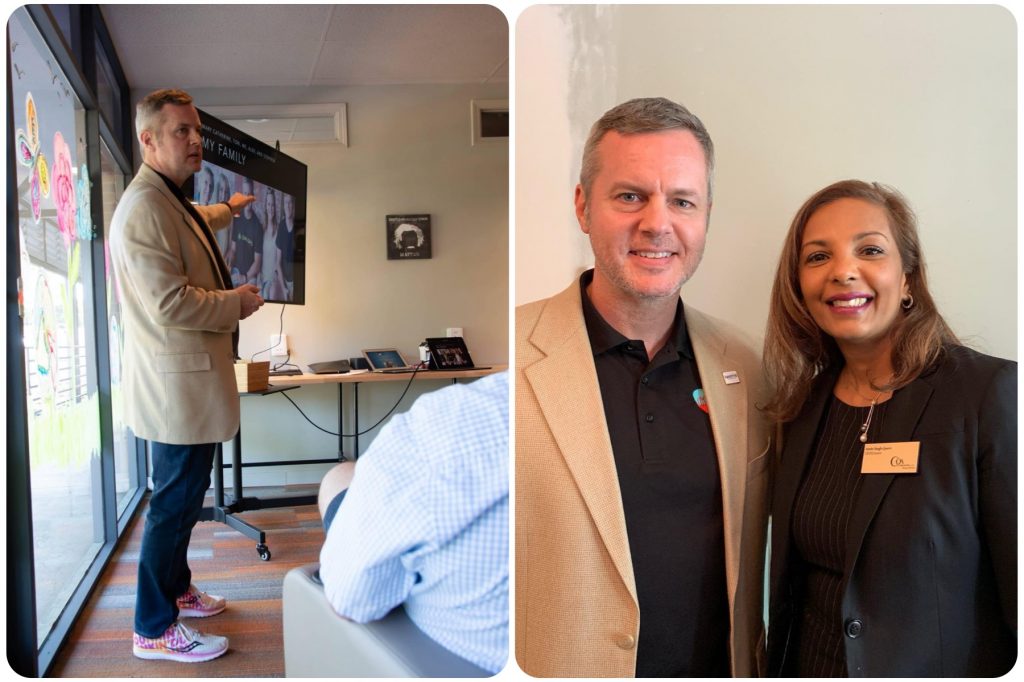
Meeting of the Minds presentation on 4/16/19 at Launch and Go Workspace. Yes, Joe is wearing Dunkin’ Donut running shoes. Joe Domaleski with Annie Singh-Quern. Photo/Kavian Baker
I had decided to make one of my favorite poems the basis of the presentation. Here’s a link directly to the author’s website so you can read the poem yourself.
The Invitation by Oriah “Mountain Dreamer”
The poem takes the reader on a journey through five phases:
• The dream, both shattered and realized
• The sting of failure, can you tolerate that?
• The joy of success, can you handle that?
• The discipline of doing what needs to be done
• The discovery of self
I cried as I read the poem. As I looked around the room that night, I was not the only one. Apparently, I had touched a nerve—in a good way. There was a vibe that night that I haven’t sensed in very many business presentations. We bonded in a way that no training class or seminar can. Indeed, I came to realize that most of us are on similar journeys. It’s true that I had been on my journey a little longer than most of the people in the room that night, which made the next part of the presentation even more relevant.
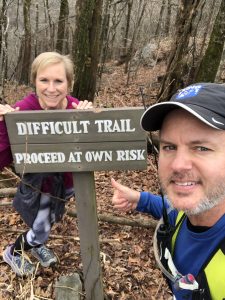
Joe & Mary Catherine Domaleski about to make the steep climb up to Mount Oglethorpe from the Big Canoe community in Jasper, GA. Photo/Joe Domaleski
As I was drying my eyes, trying to gain composure, I told the audience of entrepreneurial brothers and sisters the five things I wish someone had told me when I started my business:
- The dream is more important than the plan.
- You will experience failure; can you tolerate that?
- You will experience joy; can you handle that?
- It’ll require discipline to do what’s needed.
- Running a business is one of the best ways to truly know yourself.
In conclusion, I’ve come to realize that running a business is not about income statements and business plans. It’s all about you as a person. Your personality and attitude affect the trajectory of your business. Indeed, personality patterns are like dragons. There’s an old Chinese proverb about dragons:
“Ignore the dragon and it will eat you.
Confront the dragon and it will defeat you.
Learn to ride the dragon and you will take advantage of its might and power.”
The key is to recognize and learn to use the strengths that are hidden in your patterns, not to be consumed by them.
Do you like the company you keep in the empty moments?
Here’s a LINK to a PDF copy of the original presentation I gave to everyone that night.
[Joe Domaleski, a Fayette County resident for 25 years, is the owner of Country Fried Creative – an award-winning digital marketing agency located in Peachtree City. His company was the Fayette Chamber’s 2021 Small Business of the Year. Joe is a husband, father of three grown children, and proud Army veteran. He has an MBA from Georgia State University and enjoys sharing his perspectives drawing from thirty years of business leadership experience. Sign up for the Country Fried Creative newsletter to get marketing and business articles directly in your inbox. ]
by Joe Domaleski | Mar 18, 2024 | Blog, Business, Columnists, Community, Front Page, News Center, Opinion, Top News
Have you ever looked at a piece of art, read a great story, listened to inspiring music, or looked at a funny advertisement and thought, “That’s really creative”? Have you ever looked at a clever piece of “redneck engineering,” smiled, and thought, “That’s a creative way to solve that problem”? In many fields, except perhaps accounting, creativity is thought of as being something good. So, what is creativity, and why does it matter?
I asked some of my staff for their definitions of creativity:
“I think of creativity as a combination of imagination and knowledge.” – Hollie
“I like to think of creativity as using our minds to make something new out of what already exists.” – Erica
“I think creativity is being able to express your thoughts, ideas, and emotions be it in the way we dress, work, speak, and live our lives in a way that represents who we are and how our minds interpret those thoughts, ideas, and emotions.” – Christina
“I would define creativity as the ability to piece together aspects of different experiences to make something new and innovative.” – Zavion
“I think creativity is the ability to use your imagination to create something new and then the ability to express that thought in different mediums and formats.” – Janine (our Creative Director)
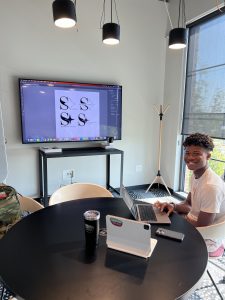
CFC graphic design intern Zavion Green working on creative logo designs for a local nonprofit. Photo/Joe Domaleski
Some common themes expressed in these definitions are:
- Imagination
- New
- Ideas
- Knowledge
- Innovation
- Assembly
- Expression
- Emotion
- Thoughts
- Artistry
- Ingenuity
One of my favorite quotes about creativity comes from the late Steve Jobs, Founder and CEO of Apple:
“Creativity is just connecting things. When you ask creative people how they did something, they feel a little guilty because they didn’t really do it, they just saw something. It seemed obvious to them after a while. That’s because they were able to connect experiences they’ve had and synthesize new things. And the reason they were able to do that was that they’ve had more experiences or they have thought more about their experiences than other people. Unfortunately, that’s too rare a commodity. A lot of people in our industry haven’t had very diverse experiences. So they don’t have enough dots to connect, and they end up with very linear solutions without a broad perspective on the problem. The broader one’s understanding of the human experience, the better design we will have.” – Steve Jobs, Make Something Wonderful
In most of the definitions and themes above, creativity was associated with taking existing knowledge and applying it in new or novel ways. So, why is that important?
Creativity is not just about art, but also business. Creativity fosters progress and change. It helps us break out of ruts and sticking points to move in new directions. Creativity is often the spark that helps launch new businesses and power entrepreneurial dreams. Without creativity, we would stagnate. Here’s some specific benefits and applications of creativity.
- Personal style – Creativity allows people (and organizations) to express identity and personality through various forms, such as fashion, art, music, and communication. Creative personal expression helps people stand out in a cluttered world of sameness.
- Cultural expression – Groups of people form communities that have shared culture, beliefs, values, and heritage. Cultural expression can show up in many forms, including dress, cuisine, traditions, communication, and other things that reflect different facets of the human experience.
- Problem solving – Creative problem solving is one of my personal favorites. It allows for the consideration of unconventional means to overcome challenges and barriers.
- Learning – Creative learning helps fuel curiosity, exploration, and consideration of ideas in new ways. We all tend to learn in different ways. Applying creativity to education improves learning to help create those “a-ha moments.”
- Economic growth – Innovation leads to economic growth, and creativity leads to innovation. Building a better widget, reducing costs, solving problems, and making life easier are all hallmarks of the importance of creativity in the business world.
- Social improvement – Most social change begins with creativity. Creativity assumes there may be a better way by considering different perspectives, amplifying stifled voices, and imagining better futures.
- Resilience – Creativity helps people and societies become more adaptable to change. Overcoming adversities and challenges requires flexible thinking and looking at old things in a new light.
Creativity is what makes us human. So, what about the impact of Artificial Intelligence (AI) on creativity? There’s no doubt that AI is a powerful tool that can be used to foster creativity. I wrote about how I use AI last fall. In fact, I am currently conducting research regarding AI as it pertains to marketing management. But for all of its strengths, it has some glaring weaknesses. AI does not have our sense of perspective and experiences. AI does not have intuition or empathy. It hasn’t lived and, therefore, it can’t experience things as a human can. It doesn’t know right from wrong.
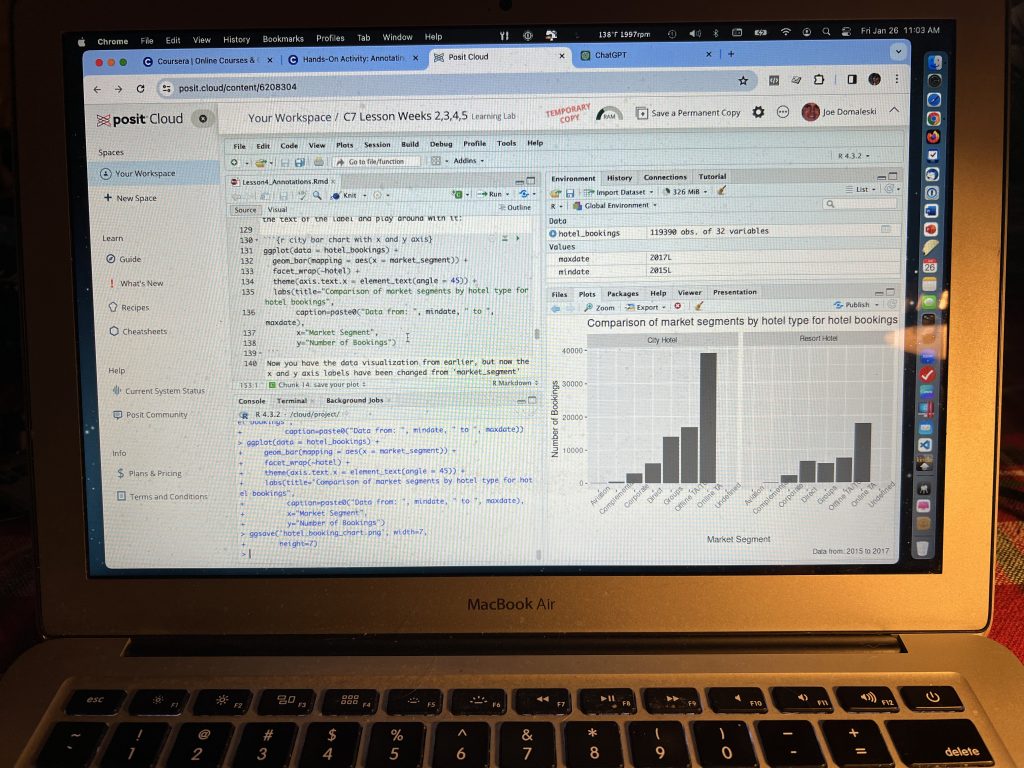
The author uses Artificial Intelligence (AI), statistics, R programming, and creativity to solve a marketing problem. Photo/Joe Domaleski
Underneath the hood, most AI is based on different types of algorithms (such as regression, decision trees, support vector machines, clustering, and neural nets) and mathematical representations of knowledge (mostly probability, statistics, linear algebra, and calculus). Is AI creative? Yes, if you accept the definitions of AI at the top of this article – AI is creative. It does have the ability to consider existing knowledge and identify new patterns to create things. Does that bother me? No. While it’s true that we live in a world defined by math and science, we have something AI does not. AI does not have a soul, and we do.
Expression, creation, and innovation based on soulful creativity is the wave of the future. It’s literally what helped us get this far as a species, and I believe it’ll serve us well as we head into an uncertain future with or without AI. Creativity is so important to me that I made that part of our company name (Country Fried Creative) years ago. Creativity is literally what keeps the world moving in a forward direction.
How do you use creativity in your personal and professional life?
[Joe Domaleski, a Fayette County resident for 25 years, is the owner of Country Fried Creative – an award-winning digital marketing agency located in Peachtree City. His company was the Fayette Chamber’s 2021 Small Business of the Year. Joe is a husband, father of three grown children, and proud Army veteran. He has an MBA from Georgia State University and enjoys sharing his perspectives drawing from thirty years of business leadership experience. Sign up for the Country Fried Creative newsletter to get marketing and business articles directly in your inbox. ]
by Joe Domaleski | Mar 11, 2024 | Blog, Business, Columnists, Community, News Center, Opinion
Last week, a friend of mine, who rarely calls me, did that very thing. Noticing that it wasn’t a spam call, I answered. He asked me a simple non-work-related question, but I didn’t have the answer.
The dialogue went like this:
My friend asked, “Do you know when the next meeting is?”
“I’m not sure, but I know it’s on the website,” I replied.
He insisted, “I don’t have time to look at the website. I’m standing here with someone who wants the answer right now.”
“Well, I think as soon as we hang up, you can probably pull it up on the website. The website works fine on mobile phones. I believe the information you seek is on the home page in the top right corner if memory serves correctly.”
My friend pushed harder, “Look, I don’t have time to load the website on my phone. Do me a favor and as soon as we hang up, will you look it up for me and then call me back with the information?”
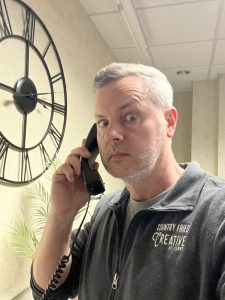
The author on the phone. Photo/Joe Domaleski
“Are you in distress?” I asked.
“No, why would you say that?” he replied.
“Well, I just don’t understand why you don’t have time to look something up on the website, and we’ve been talking about it for the past few minutes. As soon as we hang up, you could have the information immediately if you looked it up yourself. If I had known the answer to your question, I would have told you, but I don’t. However, I know you can find the answer on the website,” I stated.
My friend got a little testy, “I don’t know why the answer to everything is to look it up online. I’m too busy to fool around with websites. I’ll just call someone else.”
“Hey, before you go, quick question – why did you call me instead of someone else?” I asked.
“Well, Joe, you’re always so well informed. You seem to be plugged in and know what’s going on in the community. I figured you’d just tell me what I needed to know.”
“Fair enough, talk to you later,” I answered.
We ended the call, and I stood there stunned. Honestly, I’m not sure if I should be flattered that he thought I knew the answer to his question or feel foolish that I’m enabling lazy behavior. Maybe I just read too much into the situation. I wanted to tell him the reason I’m well informed is that I seek out information instead of waiting for it to be spoon-fed to me. I know that the information he asked about was sent out several times via email, and it’s on the organization’s website along with other events. This situation got me thinking about whether staying informed is a privilege, a responsibility, or both.
The fact that you, dear reader, are reading this article indicates that you are probably someone who seeks out information on your own. You’re to be commended for that. Have you encountered situations like the one I described above? Does it frustrate you, or do you enjoy being a conduit of information? I like being helpful, I really do. An occasional “lazy question” from a friend doesn’t bother me, and I’ve probably done my fair share of that when I can’t find something – but I always start with the premise of trying to find information myself. I can’t imagine waiting for information to find me.
It’s a privilege in our great country to have access to information – we have a free press, (mostly) open government, the right to free speech, and the increasingly wild world of online information via websites and social media. If you wait for a computer algorithm to serve up the information it thinks you need to know, then you’re going to be trapped in an illusory world of make-believe. Burst the bubble of misinformation and take responsibility for your information. A few weeks ago, I listed some of my favorite news sources, and that spurred some great dialogue where I learned about even more places for information.
Don’t abdicate your responsibility to stay informed. Be deliberate in knowing what’s going on around you – at home, at work, in the local community, and in the world at large. Be mindful of rumors, gossip, and speculation. Always seek the truth from a diversified set of information. Things are rarely black and white. Truth is often nuanced because it has to go through a human filter.
Here are some tips on staying educated and upholding your responsibility to be an informed person:
- Use technology to your advantage and automate your information gathering. Most modern organizations, including this newspaper, put out email newsletters. Sign up for them and let information come to you. Even if I don’t immediately read an email newsletter, I have it there for reference. Our local Chamber of Commerce, municipalities, and government officials put out information regularly.
- Develop good information-gathering habits. I make it a point every day to keep up with the news by having it as a task on my daily to-do list to remind me (note: I use Things 3 for MacOS and iOS for task management).
- Seek diversified opinions and advice. Don’t let others tell you what to think. Evaluate evidence and formulate your own opinions. Most people do not have access to “the big picture” of any situation.
- Avoid gossip and rumors. Gossip is rarely true, although it may have at one time been based on a nugget of truth. When you hear a rumor, an immediate concern should be “why is this person telling me this?” Are they trying to sabotage someone or something? Are they bitter about something? Is there a legitimate concern that should be investigated further? If you believe a rumor has merit and may impact you, then seek out the truth. We live in a small community, and what goes around comes around. Don’t become known as a gossiper.
- Withhold opinions unless there’s a need to express them. Some things are better left unsaid. I have a hard time with this personally because I like to talk and engage in discussions. Indeed, I’m a professional marketer, so it’s my business to promote things and be communicative. Discretion is advised. Just because you hear a rumor, questionable assertion, or obviously biased statement doesn’t mean you need to weigh in on it. We’ve all gotten sucked into “flame wars” by internet trolls. Just walk away unless there’s a very compelling reason to chime in. If someone says something blatantly false about someone or something I care about, I will take a stand – but not everything warrants that.
- Trust, but verify. In general, I tend to trust people and assume the best of everyone – sometimes to my detriment. Life is too short to be mean and challenge everyone directly. On the other hand, taking responsibility for information means verifying its truth. This is especially difficult if you’re a leader who relies on the advice and information from others in an organization. Last year, I made the mistake of relying on someone who I thought was doing their job but wasn’t. It created an awkward situation that required a careful solution. The good news is that the situation was resolved, and we learned from it.
- Don’t be a burden to others. No one enjoys the needy friend who is always asking everyone what’s going on because they’re too lazy to find out for themselves. If you do need help, let others know you tried to find out the information and what you were able to find. Doing that shows you are committed to an answer and may help the person you’re asking to better understand the context of your question.
Staying informed is a privilege and responsibility that demands both curiosity and diligence. In an earlier article I wrote about the importance of data. Whether it’s a rumor, meme, blog post, or an opinion from an individual person we know that a single data point is not enough information to develop any sort of credible opinion. Avoid gossip, rumors, and speculation that that’s overtly negative. Developing a hypothesis or trend line requires multiple data points. Seek out information from a wide variety of sources and do so regularly. Doing so will help you better understand the world around you. Being well-informed is not just for our benefit but it also helps our community when we have an educated citizenry.
How do you stay informed?
[Joe Domaleski, a Fayette County resident for 25 years, is the owner of Country Fried Creative – an award-winning digital marketing agency located in Peachtree City. His company was the Fayette Chamber’s 2021 Small Business of the Year. Joe is a husband, father of three grown children, and proud Army veteran. He has an MBA from Georgia State University and enjoys sharing his perspectives drawing from thirty years of business leadership experience. Sign up for the Country Fried Creative newsletter to get marketing and business articles directly in your inbox. ]


